Realism in art and literature focuses on depicting subjects truthfully, without idealization or romanticizing, capturing everyday life with accuracy and detail. This movement emphasizes authentic representation of ordinary people, social conditions, and the environment, often highlighting the mundane or gritty aspects of existence. Explore the rest of the article to understand how realism shapes creative expression and influences contemporary storytelling.
Table of Comparison
| Aspect | Realism | Normativism |
|---|---|---|
| Definition | Philosophical view that reality exists independently of beliefs or perceptions. | Philosophical doctrine that norms or rules constitute the basis of reality or truth. |
| Ontology | Objects and facts have objective existence. | Reality is grounded in norms and prescriptive principles. |
| Epistemology | Knowledge reflects an objective external world. | Knowledge depends on normative frameworks and rules. |
| Focus | What is -- the factual and empirical world. | What ought to be -- norms and values. |
| Examples | Scientific realism, metaphysical realism. | Ethical normativism, legal normativism. |
| Philosophical Role | Explains existence and truth beyond human perspectives. | Explains meaning and correctness based on normative criteria. |
Introduction to Realism and Normativism
Realism in philosophy asserts that certain entities or truths exist independently of human beliefs or perceptions, emphasizing objective reality and factual accuracy. Normativism, by contrast, centers on norms, values, and prescriptions, highlighting how things ought to be rather than how they inherently are. The debate between realism and normativism fundamentally explores the tension between descriptive facts and prescriptive standards in ethics, law, and social sciences.
Defining Realism: Key Concepts and Principles
Realism in legal philosophy asserts that law is grounded in social facts and power structures rather than abstract moral principles, emphasizing how laws operate in practice over their theoretical ideals. Key concepts include the recognition that judicial decisions are influenced by political, economic, and social factors, highlighting law as a dynamic system shaped by human behavior. Realism challenges normative legal theories by prioritizing empirical evidence and observable outcomes in understanding the nature and function of legal systems.
Understanding Normativism: Core Tenets
Normativism in legal philosophy asserts that law is fundamentally a system of norms prescribing how individuals ought to behave, emphasizing the role of rules, duties, and moral principles in shaping legal validity. It rejects the descriptive approach of Legal Realism, which views law as a set of social facts influenced by judges' behaviors and societal conditions, focusing instead on the prescriptive nature and internal logic of legal systems. Key tenets include the belief that legal norms derive their authority from normative criteria rather than empirical practices, and that law's primary function is to guide conduct through obligatory standards.
Historical Evolution of Realism and Normativism
Realism and Normativism have evolved through distinct historical trajectories, with Realism emerging prominently during the early 20th century as a response to idealistic views in international relations, emphasizing power politics and state sovereignty. Normativism gained prominence later, influenced by philosophical developments in ethics and law, stressing moral principles, human rights, and international norms as guiding forces in global affairs. The ongoing debate reflects a shifting balance between the pragmatic assessment of power and the aspirational pursuit of normative values in shaping international policies.
Realism vs Normativism in Philosophy
Realism in philosophy asserts that objects and moral facts exist independently of human beliefs or perceptions, grounding ethical truths in objective reality. Normativism emphasizes that moral norms and principles derive from human conventions, social practices, or rational prescriptions rather than independent truths. The debate centers on whether ethical statements describe objective states (realism) or serve as guidelines shaped by human reasoning and society (normativism).
Realism and Normativism in Ethics
Realism in ethics asserts that moral facts exist independently of human beliefs or perceptions, grounding ethical principles in objective reality. Normativism emphasizes the role of norms and prescriptions that guide moral behavior, focusing on what ought to be done rather than describing how things are. The debate between ethical realism and normativism centers on whether morality is discovered through objective truths or constructed through normative frameworks.
Impact on Social and Political Thought
Realism emphasizes objective social facts and power dynamics, influencing political thought by prioritizing empirical analysis and pragmatic policy decisions. Normativism centers on moral values and ideals, shaping social and political theories that advocate justice, rights, and ethical governance. The impact of both perspectives fosters ongoing debates on balancing factual realities with normative aspirations in shaping societal structures and policies.
Comparative Strengths and Weaknesses
Realism emphasizes objective truths and observable phenomena, offering robust explanatory power in empirical contexts but often criticized for neglecting ethical dimensions. Normativism prioritizes moral values and ideals, providing a framework for guiding behavior and policy yet sometimes lacking empirical rigor and predictive accuracy. The comparative strength of realism lies in its factual grounding, whereas normativism excels in ethical clarity, creating a tension between descriptive accuracy and evaluative guidance.
Contemporary Debates: Realism vs Normativism
Contemporary debates between realism and normativism center on the nature of moral truths and the role of normative judgments in ethical theory. Realism asserts that moral facts exist independently of human beliefs, while normativism emphasizes the prescriptive role of moral language and the influence of societal norms. Key philosophical discussions address whether ethical statements describe objective realities or serve to guide actions within social frameworks.
Conclusion: Future Directions and Implications
Future directions in the debate between Realism and Normativism emphasize integrating empirical research with normative theory to address complex ethical dilemmas more effectively. Advancements in interdisciplinary studies, including cognitive science and social epistemology, are poised to refine our understanding of how moral facts and normative principles interact. This convergence holds significant implications for developing practical ethical frameworks that are both descriptively accurate and normatively actionable.
Realism Infographic

 libterm.com
libterm.com